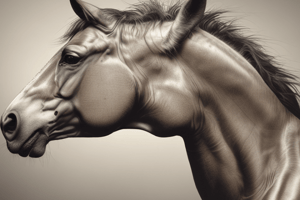Podcast
Questions and Answers
What is the oldest branch of zoology?
What is the oldest branch of zoology?
- Cytology
- Histology
- Physiology (correct)
- Anatomy
Who is considered the father of medicine?
Who is considered the father of medicine?
- Plato
- Socrates
- Aristotle
- Hippocrates (correct)
In which century did modern physiology first appear?
In which century did modern physiology first appear?
- 18th century
- 17th century (correct)
- 19th century
- 16th century
What are the structural levels of organization in the body?
What are the structural levels of organization in the body?
What are the macromolecular compositions of cells?
What are the macromolecular compositions of cells?
Flashcards
Oldest branch of zoology
Oldest branch of zoology
Physiology is the study of how living things work.
Father of medicine
Father of medicine
Hippocrates is a Greek physician who is credited as the founder of modern medicine.
Modern physiology's century
Modern physiology's century
The 17th century is when modern physiology emerged.
Body organization levels
Body organization levels
Signup and view all the flashcards
Cell components
Cell components
Signup and view all the flashcards
Study Notes
Foundations of Zoology and Medicine
- The oldest branch of zoology is Zoography, which deals with the description of animals.
Early Development of Medicine
- Hippocrates is considered the father of medicine.
Development of Physiology
- Modern physiology first appeared in the 19th century.
Structural Levels of Organization in the Body
- The structural levels of organization in the body are: chemical, cellular, tissue, organ, organ system, and organism.
Macromolecular Compositions of Cells
- The macromolecular compositions of cells include: carbohydrates, proteins, lipids, and nucleic acids.
Studying That Suits You
Use AI to generate personalized quizzes and flashcards to suit your learning preferences.




